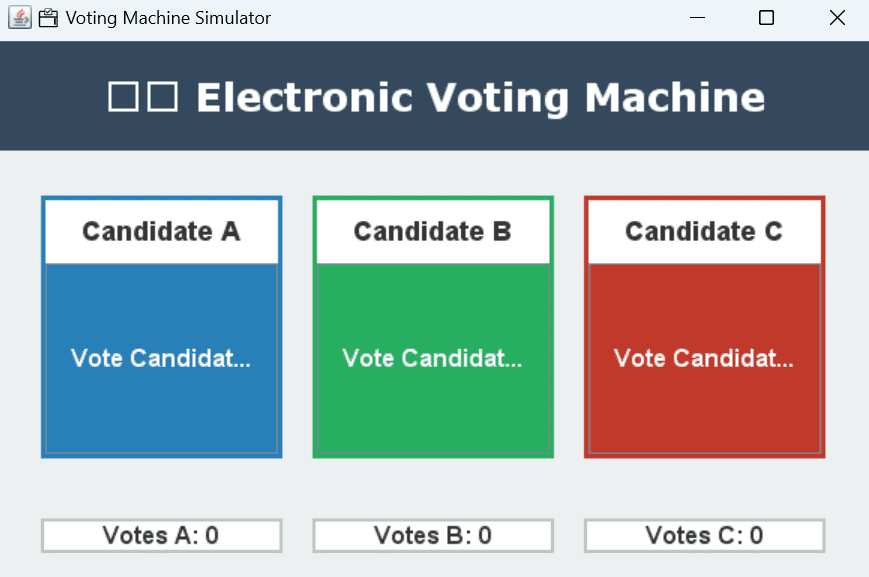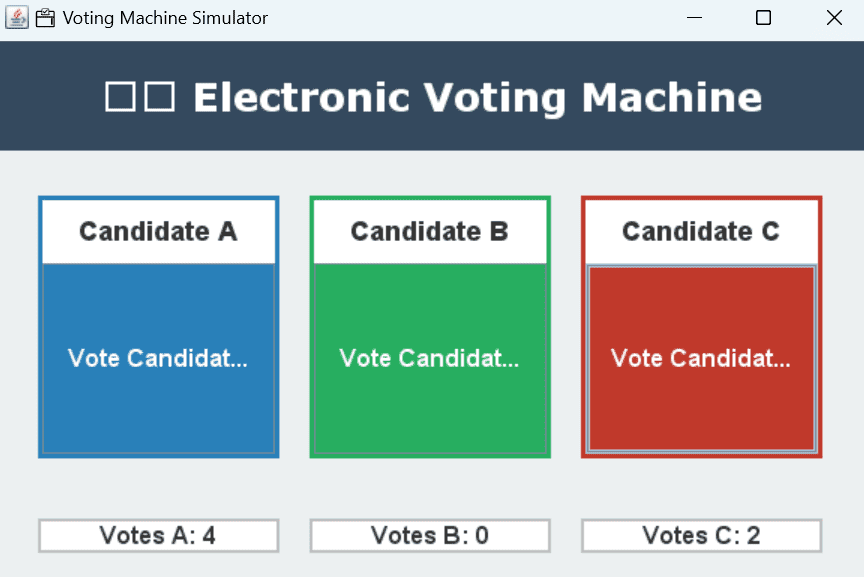Voting Machine Simulator in java

introduction
TheVoting Machine Simulator in java is a Java-based project that mimics the operation of a real electronic voting machine (EVM). Voters can select candidates from a displayed list, and the system ensures one vote per voter through a unique ID check.
Once the voting is complete, the admin can unlock the result screen to display vote counts per candidate. This project demonstrates how secure, transparent, and tamper-proof digital voting systems can work.
It’s suitable for civic education, mock elections in schools/colleges, and technical demonstrations on event-driven programming and data validation in Java.
steps to create voting machine stimulator in java
-
Define voting rules — one vote per voter.
-
Design voter authentication GUI.
-
Create Candidate and Voter classes.
-
Implement voting logic with vote counting.
-
Store votes securely.
-
Prevent duplicate voting by voter ID.
-
Add admin interface for result display.
-
Test voting, counting, and result display.
-
Add error handling.
-
Document code and user instructions.
code explanation
1. Window Setup
setTitle("Voting Machine Simulator");
setSize(600, 400);
Creates a window titled “Voting Machine Simulator”.
2. Top Heading
JLabel heading = new JLabel("Electronic Voting Machine");
Adds a nice title label at the top with background color and font styling.
3. Vote Buttons
votePanel.add(createVoteButton("Candidate A", blue));
3 buttons are created: “Vote Candidate A”, “Vote Candidate B”, “Vote Candidate C”.
Each button has a color and a label.
When a button is clicked:
It increases that candidate’s vote count.
The results are updated immediately.
4. Results Display
lblVotesA = createResultLabel("Votes A: 0");
At the bottom, it shows current vote count for each candidate.
Initially all are 0 votes.
5. Clicking the Button
btn.addActionListener(e -> {
if (name contains "A") votesA++;
...
updateResults();
});
When you click on any vote button:
It checks which candidate the button is for.
Adds 1 to their vote count.
Then updates the display.
6. Running the App
public static void main(String[] args) {
SwingUtilities.invokeLater(() -> new VotingMachineSimulator().setVisible(true));
}
This runs the GUI on screen.
Output Preview:
Top: “Electronic Voting Machine”
Center: 3 colored buttons for Candidate A, B, and C
Bottom: Vote count for each candidate, like:
Votes A: 3 Votes B: 2 Votes C: 1
source code
import javax.swing.*;
import java.awt.*;
import java.awt.event.*;
public class VotingMachineSimulator extends JFrame {
private int votesA = 0, votesB = 0, votesC = 0;
private JLabel lblVotesA, lblVotesB, lblVotesC;
public VotingMachineSimulator() {
setTitle("🗳️ Voting Machine Simulator");
setSize(600, 400);
setLocationRelativeTo(null);
setDefaultCloseOperation(EXIT_ON_CLOSE);
setLayout(new BorderLayout());
JLabel heading = new JLabel("🗳️ Electronic Voting Machine", JLabel.CENTER);
heading.setFont(new Font("Verdana", Font.BOLD, 26));
heading.setOpaque(true);
heading.setBackground(new Color(52, 73, 94));
heading.setForeground(Color.white);
heading.setBorder(BorderFactory.createEmptyBorder(20, 0, 20, 0));
add(heading, BorderLayout.NORTH);
JPanel votePanel = new JPanel(new GridLayout(1, 3, 20, 20));
votePanel.setBorder(BorderFactory.createEmptyBorder(30, 30, 30, 30));
votePanel.setBackground(new Color(236, 240, 241));
votePanel.add(createVoteButton("Candidate A", new Color(41, 128, 185)));
votePanel.add(createVoteButton("Candidate B", new Color(39, 174, 96)));
votePanel.add(createVoteButton("Candidate C", new Color(192, 57, 43)));
add(votePanel, BorderLayout.CENTER);
JPanel resultPanel = new JPanel(new GridLayout(1, 3, 20, 20));
resultPanel.setBorder(BorderFactory.createEmptyBorder(10, 30, 20, 30));
resultPanel.setBackground(new Color(236, 240, 241));
lblVotesA = createResultLabel("Votes A: 0");
lblVotesB = createResultLabel("Votes B: 0");
lblVotesC = createResultLabel("Votes C: 0");
resultPanel.add(lblVotesA);
resultPanel.add(lblVotesB);
resultPanel.add(lblVotesC);
add(resultPanel, BorderLayout.SOUTH);
}
private JPanel createVoteButton(String name, Color color) {
JButton btn = new JButton("Vote " + name);
btn.setFont(new Font("Arial", Font.BOLD, 16));
btn.setBackground(color);
btn.setForeground(Color.white);
btn.setFocusPainted(false);
btn.addActionListener(e -> {
if (name.contains("A")) votesA++;
else if (name.contains("B")) votesB++;
else if (name.contains("C")) votesC++;
updateResults();
});
JPanel panel = new JPanel(new BorderLayout());
JLabel label = new JLabel(name, JLabel.CENTER);
label.setFont(new Font("Arial", Font.BOLD, 18));
label.setBorder(BorderFactory.createEmptyBorder(10, 0, 10, 0));
panel.setBackground(Color.white);
panel.setBorder(BorderFactory.createLineBorder(color, 3));
panel.add(label, BorderLayout.NORTH);
panel.add(btn, BorderLayout.CENTER);
return panel;
}
private JLabel createResultLabel(String text) {
JLabel label = new JLabel(text, JLabel.CENTER);
label.setFont(new Font("Arial", Font.BOLD, 16));
label.setOpaque(true);
label.setBackground(Color.white);
label.setBorder(BorderFactory.createLineBorder(Color.LIGHT_GRAY, 2));
return label;
}
private void updateResults() {
lblVotesA.setText("Votes A: " + votesA);
lblVotesB.setText("Votes B: " + votesB);
lblVotesC.setText("Votes C: " + votesC);
}
public static void main(String[] args) {
SwingUtilities.invokeLater(() -> new VotingMachineSimulator().setVisible(true));
}
}
output



